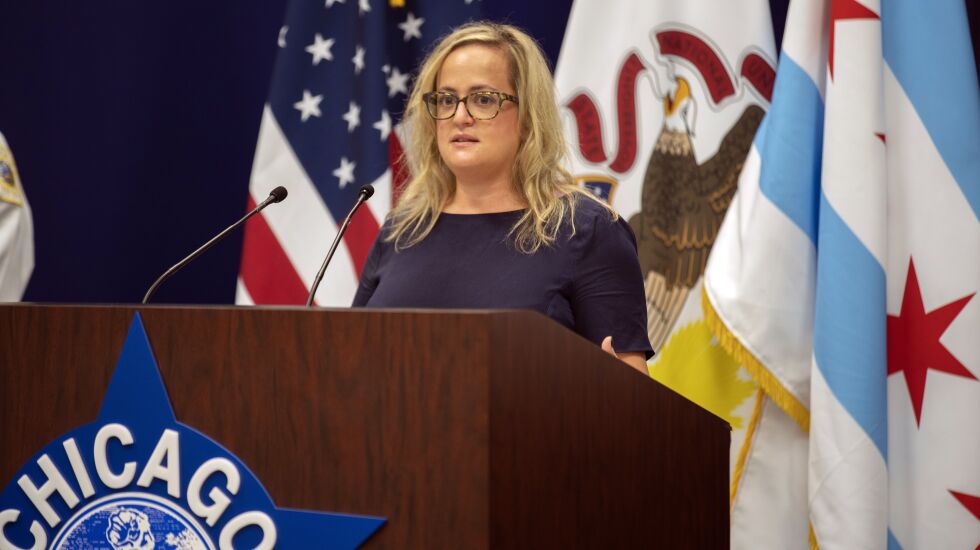
The relentless string of canceled days off blamed, in part, for 10 Chicago Police suicides since 2018 — three of them in July — has been “pared down significantly,” but long-term relief is awaiting arbitration, a top mayoral aide told skeptical alderpersons Thursday.
Elena Gottreich, Mayor Lori Lightfoot’s fourth deputy mayor for public safety, said the mayor’s office “recognizes the urgent need to put guardrails in place to protect the predictability of our officers’ schedules while balancing the need to protect the public in a post-pandemic era.”
“The days off canceled has been pared down significantly. There were obviously an extra amount of days off canceled throughout this last spring and summer period. That has been scaled back,” Gottreich said during a subject matter hearing Thursday on officer wellness.
Urging alderpersons not to “believe everything they see” on social media, she said, “A lot of those reports were incorrect. While people did work several days in a row, that has been scaled back.”
Ald. Matt O’Shea (19th) is so concerned about the mental health of CPD officers, he has introduced an ordinance that would guarantee officers at least 24 hours of consecutive rest for every 60 hours they work. That’s one day off a week to decompress.
Gottreich said the mayor’s office is trying to “do better than one day a week” to give inundated and overworked Chicago Police officers the time off they desperately need to unwind, decompress and spend time with their families, even though there are nearly 2,000 police vacancies.
But it will have to wait until an independent arbitrator rules on the issue.
“It’s not as simple as the superintendent being able to, with a stroke of a pen, grant that day off because, like it or not, the union put forth a proposal. You proposed your ordinance. And there were other ordinances too. They’re very good. But once the union has its own proposal, that has to be arbitrated,” Gottreich said.
“At this point, it goes into [the category of unfair] labor practices for the superintendent to interfere with that before the collective bargaining is over. Do we want people to have one day off a week? Absolutely. I don’t think the superintendent would disagree with that. The point of collective bargaining is to make sure” that the process is followed.
O’Shea didn’t buy it. He told Gottreich he was “getting emails as we speak from police officer families” poking holes in the deputy mayor’s claim about canceled days off being “pared down significantly.”
“I have one question: Does Superintendent [David] Brown have the ability to, with the stroke of a pen, give our police officers…one day off? If he has that ability, why aren’t we doing that [to] give them a break?” O’Shea said.
Tina Skahill, the former high-ranking police officer serving as CPD’s director of constitutional policing, said it’s not that simple.
“Which day off? Can you have an entire department take off the same day?... It’s not a unilateral thing. That’s what the deputy mayor was saying. It is in negotiations,” Skahill said.
Mayoral challenger Ray Lopez (15th) joined O’Shea in poking holes in “what I’m hearing from the department and the administration to what I know is going on on the streets.”
Lopez said he wants to make certain that “if someone needs to take a step back, that they can do it without being harassed by their superiors or their higher-ups as to why they’re taking so much time away when we’re saying here today that their mental health is important.”
Skahill encouraged officers to “bring that information to Internal Affairs,” a bureau that she once ran.
“That is something we do not sanction about officers being harassed to taking time off,” she said.
The debate nearly turned ugly when Lopez asked whether a shortage of time off would “hurt the mental health” of Chicago police officers.
“If you want anybody to say here that canceling days off causes suicide, that’s categorically untrue. And frankly, it’s a little bit offensive to talk about mental health in that context,” Gottreich said.
Lopez countered, “I did not mention suicide. I just asked about mental health.”
Sensing disaster, Public Safety Committee Chair Chris Taliaferro (29th) ran interference.
“I’m gonna stop this before it even gets started,” he said.
Alexa James, the chief executive of the National Alliance on Mental Illness Chicago, stepped down as CPD’s senior adviser on wellness after just one year, fearing she was adding “very little value.” She has decried the practice of canceling days off as “inhumane.”
On Thursday, James said creating a culture of wellness at CPD will require a “scaffolded approach — and a “significant investment” — to combat the “culture of toughness” that discourages officers from seeking the help they desperately need.







